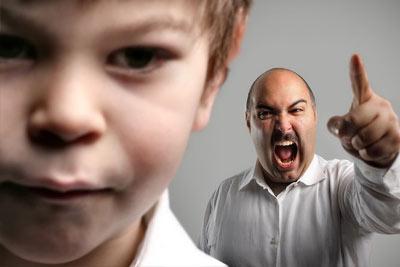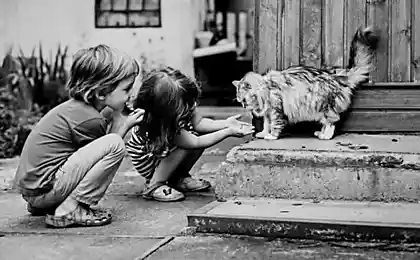1133
Don'ts PARENTS

Optionally, learn by heart the work Makarenko to guess: children can not cry, can not be beat, and with the penalties need to be more careful. We decided to analyze all the nuances of behavior that is unacceptable in relation to children and help parents no longer pass the forbidden line.
1. Screaming
Creek - is not rage and did not wish to harm the baby, and the signal helplessness. That's it and read by children: their parents screaming they perceive as insecure, unstable, causing them to get scared.
Creek just is contraindicated in education: the fact that it builds a child demonstrative. When my mother starts yelling, the child gets used to cry, kicking on the floor, stomping her foot and cheat her even more. This is because the child gets used to the emotional reactions, and he uses them.
Easy to say, you might think. Because children sometimes maddening that expose themselves to real danger. Is it worth a pat on the head, if he reaches for a hot pan?
Instead of shouting:
1. The Contracting with the child. If his eternal failures (to walk, to eat, to go to school) make you hysterical, make him an offer he can not refuse. For example: either he was going for a walk, a mother with him does not go anywhere (as long as the baby is running with one tie his shoes, just go back to business - you have the same contract).
2. Get out of the room. The vast majority of children's tantrums have absolutely demonstrative. So the child is trying to call my mom emotions (and, by the way, not out of malice, but because any nedobiraet them or touches). Give the little artists to settle down: let learns that a provocation - it is a weak argument.
3. Reassure him. For example, he once again brings you to a fine fit, going across the corridor and banging his fists on the floor. And you calm down, take a magazine or book and read until the child stops tantrum. The more you repeat it, the sooner the kid learns to keep his emotions under control.
2. Beat
Of course, after reading this paragraph, most parents will say, "Yes, we finger did not touch him!" And now think of all these little slaps on dragged into an outlet handle weak slaps that should "bring him to his senses" and other physical "small things" that does not give him a real pain, but frightening and humiliating.
Beat in any time children can not, and the force of impact is not important. And we're doing it again helplessness: unable to contain their fears, we allow such blunders.
Instead of spanking:
1. Do not make a priori situations where a child is in danger at home. While it is small, all the sockets, electric wire, and heavy things that the child may topple over, must be hidden and closed. If he reached out to them - it is your fault: the child only learns, not trying to annoy you.
2. Learn to calm yourself. Count to ten, go into another room, tearing a piece of paper ... But Do not remove the anger on the child.
3. Explain to the child the principle of operation of the electric kettle, give play to the iron off - let examine it thoroughly. Take time to discover the world of the child and explain what it concealed danger.
3. Climb into his personal life
It concerns have older children. They - new friends, first novels, their companies ... Parents love to start a Gestapo interrogation on the subject "What is this boy" and "where his father works." The children, like adults, are not thrilled with the fact that the most intimate details of their relationship with their peers are the subject of idle discussion. A lot of guys run themselves to share, but only if they feel safe at the same time - mom and dad will not be asking him provocative questions, to delve into his relationship and try to discover some hidden secrets.
Instead of questioning:
1. "How?" - A great start to talk in a friendly atmosphere where the child came back from his first life goodbye. The answer is "normal" - is not questioned. Wants - will tell you everything.
2. If only we are not talking about drinking and smoking companies do not give their assessments of the child's friends. It would undermine his confidence, and to you, and to your own friends.
3. Allow your child to have their own space. Let not show you my correspondence, and you walk into his room only with a thud. For children is very important personal territory - otherwise they grow up neurotic.
4. drinking, smoking and swearing expressed in his presence
And this is a policy of double standards. Daddy's a jar of beer, mother's cigarette accidentally dropped by an incorrect turnover in conversation with a friend on the phone ... And the child is already beginning to perceive the classic parental prohibitions as humiliation of dignity (Yeah, dad mom can be, but I can not because I'm any worse?). < br />
A child that really there to talk - it's a big responsibility. Because of its appearance of life is changing dramatically, and this applies to subtle details. Any thing you forbid your child with the text "is for adults" - makes this a desirable thing automatically and brings the child adequate attitude to what can harm their health.
Instead of double standards:
1. You have your own nanny, grandparents, mugs ... to drink, smoke and swear and can be outside the presence of the child. But it is better to finally get off the bad habits that they are not accidentally recall the most inopportune moment.
2. Giving your child information. You can watch together scientific documentary about the dangers of tobacco, to study the effects of alcohol on the human body and to create in the mind of the child is not intimidating, or rather, medically savvy now.
5. To be afraid of his sexuality
Children grow up very quickly, and according to statistics, in 15 and a half years come in the first intimate relationship. Until this is already beginning to talk about sex, they are looking for information about him, and just give all sorts of vulgarity.
Parents are terrified clutching his head: instead of to tell teenagers about contraception, they inspire him to fear this topic that will affect the most terrible way when the child becomes an adult. Or even worse, trying to "intelligently" to behave in the process of sexual development, parents are beginning to figure out what he was doing and where walking.
Instead of fear:
1. Encourage your child to information. About condoms can start a conversation in the 13-14 years of age: the sooner he learns this, the better. But chasing him with brochures about venzabolevany not: let them have an opportunity to address to you for advice, when he wants it.
2. In general, does not apply to his personal life. If mum and dad to intervene in his first love, he can grow with an inadequate perception of the senses. And when parents are able to be friends with the child and observe his psycho-emotional autonomy, he enjoys sharing.
6. Require the child to be an excellent student
This point may seem controversial to many. Psychologists believe that parental ambition is firmly established in our mentality. This is probably the machinations of the Soviet past, when instead of individualism in people brought humility and diligence.
For many parents, school success - a reflection of their own victories. Unrealized in life makes these mothers and fathers piously believe that the child has to be "the most-most." But put pressure on him to play with the child a cruel joke: in the future, he does not learn to take responsibility for themselves, or rebel, or bestow a need to please all helpfully.
And what prevaricate? Not all children are equally capable of learning. And it does not make the child better or worse - just someone gives math, and some do not. You do not reproach myself for something that does not become a molecular biologist?
Instead requirements:
1. Take your child for who he is. Let it above the "threes" does not rise, and the gold medal he does not shine: it is a lot of other talents!
2. Line up the right psychology: study - it is the duty of the child. The sooner on his shoulders will hang the responsibility for assessment, the independent and strong it will become in the future.
3. Allow the child to be able to always come to you for training help, but had never been navyazvayte. This does not mean that he should hang around the clock on the Internet instead of lessons - hazardous to health things must also be banned. But he could read or play with friends, instead of studying the program next year in history. It's his life.
4. Remember that in our country an unhealthy attitude towards children's progress. In Europe and America at parents' meetings are talking primarily about the psychology of the child and his personal qualities, but by the end jump to marks. We, unfortunately, can not immediately rebuild the entire Russian educational system, but it can take a good example from the West, and help the child within the family.
These simple rules are easy to remember, but it can be difficult to implement. Remember that if you really are not too difficult to move any face, you can always seek help from a family psychologist, doctor or a psychoanalyst. But in general it is easier to love a child, that's all. Love - is the ability to do so he was happy.
























